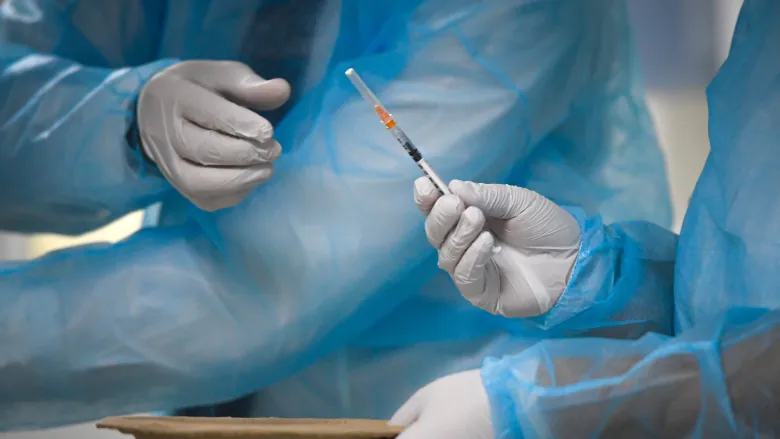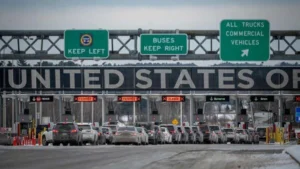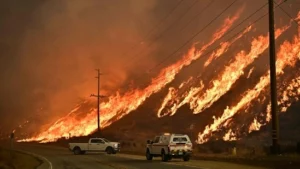Coronavirus: What’s happening in Canada and around the world on Wednesday

The World Health Organization reported that the global number of new coronavirus cases and deaths continued to fall in the past week, with an estimated 3.3 million new infections and about 55,000 deaths, marking a 10 per cent drop in both from a week earlier.
In its regular assessment of the pandemic issued on Tuesday, the UN health agency said the biggest drops in new cases were seen in:
- The Eastern Mediterranean region, which saw a 17 per cent drop in new cases.
- The Western Pacific region, with a 15 per cent drop.
- The Americas region, with a 14 per cent drop.
The WHO noted that despite a “declining trend in new weekly cases and deaths” in the Americas, the “overall epidemiological situation has not improved significantly since a surge in mid-July 2021.”
The global health agency said all regions reported more than a 15 per cent decline in deaths, except for Europe, where the number of deaths was similar to the previous week and Africa, where there was about a five per cent rise. In the Western Pacific region, the number of deaths dropped by nearly a quarter.
WHO first reported a substantial decrease in cases in mid-September at four million new cases, with declines seen in all areas of the world — the first time in more than two months that COVID-19 cases had fallen.
Winter in the northern hemisphere, however, could bring increasing case numbers as more activities move indoors.
WHO, which has been working to expand access to COVID-19 vaccines worldwide, has repeatedly decried global inequity in vaccine distribution and urged wealthier nations to do more to help countries with less access.
What’s happening in Canada
The Canadian Medical Association is calling for lockdowns in Alberta and Saskatchewan to protect health-care systems it says are crumbling under pressures caused by COVID-19.
Both provinces are setting hospitalization records, and intensive care capacity is running slim to none.
Dr. Katharine Smart, president of the national group, is urging the provincial and federal governments to take immediate action.
“This is beyond anything that the health-care system has ever faced in modern times,” Smart said in an interview Wednesday.
“What we’re seeing now is essentially no ability to provide any other acute-care medicine beyond care to people with COVID. So, in essence, the health-care system has already collapsed.”
The association is calling for short, controlled lockdowns — often called fire-breakers or circuit-breakers — that would close schools and non-essential businesses.
What’s happening around the world
As of Wednesday afternoon, more than 233 million cases of COVID-19 had been reported worldwide, according to Johns Hopkins University. The reported global death toll stood at more than 4.7 million.
In Africa, Algeria will start production of Sinovac’s vaccine in partnership with China on Wednesday with the aim of meeting domestic demand and exporting the surplus.
In the Middle East, Israeli Prime Minister Naftali Bennett says his priority is keeping the nation’s economy open and increasing vaccinations among the country’s Arab minority as Israel copes with a wave of coronavirus infections.
In Europe, British Prime Minister Boris Johnson says he’ll appoint a chair this year to the planned public inquiry into the coronavirus pandemic and bereaved families will have a role in the proceedings.
The COVID-19 Bereaved Families for Justice, which has around 4,000 members, has been calling for a public inquiry into the government’s handling of the pandemic so lessons can be learned to limit future virus-related deaths. It has criticized Johnson and his Conservative government for a lack of protective gear for health workers, delaying lockdowns and a too-lax travel policy.
ohnson confirmed in May a public inquiry will start to hear evidence next year. However, the group says, “we see no reason why preparations for the inquiry cannot begin now, particularly as nearly 1,000 people are still losing their lives each week.”
The U.K. registered 167 virus-related deaths on Tuesday. Britain has Europe’s second-highest pandemic death toll after Russia, with more than 136,500 reported deaths.
Meanwhile, in Russia, health authorities reported a record number of coronavirus deaths for the second day in a row, but authorities say they are not considering imposing nationwide restrictions.
Russia’s state coronavirus task force on Wednesday registered 857 deaths, the country’s highest daily number of the pandemic. The previous record of 852 COVID-19 deaths was reported Tuesday.
In the Asia-Pacific region, Singapore’s Health Ministry reported 2,268 new COVID-19 cases on Wednesday, the highest daily total since the beginning of the pandemic. The country also reported eight new deaths due to the illness.
A recent rise in cases after the relaxation of some COVID-19 measures has prompted Singapore to pause further reopening. Roughly 80 per cent of its population has been vaccinated against the virus.
In the Americas, at least 400,000 people in the United States have received booster doses of the Pfizer-BioNTech vaccine after U.S. health regulators cleared the third round of shots for millions of people, and a million more are seeking them, the White House said on Tuesday.
With Thanks,Reference to: https://www.cbc.ca/news/world/coronavirus-covid19-canada-world-sept29-2021-1.6193233






